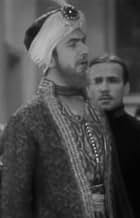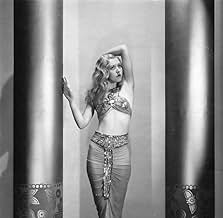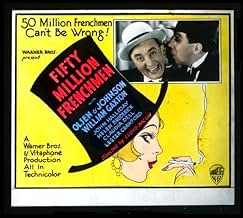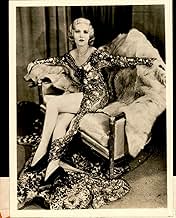El rico Jack apuesta con Michael que puede cortejar a Lu Lu sin dinero por dos semanas. Michael contrata detectives torpes para detener a Jack, llevando a cómicas desventuras mientras Jack p... Leer todoEl rico Jack apuesta con Michael que puede cortejar a Lu Lu sin dinero por dos semanas. Michael contrata detectives torpes para detener a Jack, llevando a cómicas desventuras mientras Jack persigue a Lu Lu, ocultando su estado de pobreza.El rico Jack apuesta con Michael que puede cortejar a Lu Lu sin dinero por dos semanas. Michael contrata detectives torpes para detener a Jack, llevando a cómicas desventuras mientras Jack persigue a Lu Lu, ocultando su estado de pobreza.
- Dirección
- Guionistas
- Elenco
- Simon Johanssen
- (as Olsen)
- Peter Swanson
- (as Johnson)
- Lu Lu's Mother
- (sin créditos)
- Minor Role
- (sin créditos)
- Jealous Husband
- (sin créditos)
- Effete Bar Patron
- (sin créditos)
- Minor Role
- (sin créditos)
- Orizon - Magician
- (sin créditos)
Opiniones destacadas
The basic thread of the story is not a bad one. A rich ne'er do well American playboy in Paris, Jack Forbes (William Gaxton) well financed by his industrialist father to stay as far away from the family business as possible, sees Lu Lu Carroll (Claudia Dell) and falls instantly in love. Michael Cummins (John Halliday) says that he is also interested in her. He bets Forbes that he cannot win the girl's heart without any of his money as a means to impress her and take her places. If Forbes wins, Cummins will pay him 50 thousand dollars. If Cummins wins the bet, Forbes will pay him 50 thousand dollars. In the meantime, Forbes must make his living any way that he can, starting with no money or letters of credit in his pocket.
Warner Brothers, in just another year or two with better performers, could have made this work as a pretty decent precode. The main problem is the large part that Olsen and Johnson have in this film. Their part is that Cummins hires them to make sure that Forbes doesn't cheat and borrow money off of anyone. They're just not funny and Johnson's incessant hyena-like laughter gets old in a hurry. Show me you're funny, don't TELL me you're funny! Make this about Forbes and his creative attempts to survive and impress the girl given that he has no money and no contacts in a country that is foreign to him, and this could have been interesting. Instead the focus is Olsen and Johnson and their juvenile and archaic attempts at humor.
The few interesting spots include Helen Broderick as someone who hires Forbes as a guide and Bela Lugosi as a mystic.
Back to Olsen and Johnson. Although this team is practically unknown today, they were quite successful on stage and made a few movies. Most of the ones I've seen were only fair, but their film "Hellzapoppin" is a terrific comedy. "50 Million Frenchmen" is NOT brilliant--mostly because Olsen and Johnson's material is pretty bad. Too often they weren't very funny and were quite corny--and the team laughed uproariously like every line was hilarious...which only reinforced how unfunny they were. In fact, the entire film is flat and unfunny and has not aged well. My feeling is that the film would have been much better without the comedy OR if they gave up entirely on the plot and just had a lot of zaniness (which is exactly why "Hellzapoppin" was such a good film). The other problem is that the film is simply too talky--as if the folks making the film didn't really understand the new medium of talking pictures.
Look carefully at Orizon the Magician. Underneath the beard and the costume, that's Bela Lugosi! He made this bit appearance before making his breakout film, "Dracula". However, as "50 Million Frenchmen" was held about a year before it was released, it turned out both films were released the same day back in 1931!
*While musicals were THE rage in the very early days of talking pictures, within only a couple years, the genre was pretty stale and box office receipts for these films dropped. So, while the Best Picture Oscar went to "Broadway Melody" in 1930, but around 1931 the films appeared to be passé. Because of this, studio execs ordered all the songs removed from "50 Million Frenchmen" before it was released. By about 1933-34, musicals were suddenly popular once again. Why the change? I have always assumed it's because the sound technology improvements enabled the musicals to sound a lot better and weren't inhibited by primitive microphones and flat sound. Additionally, the studios simply refined their style and plots enough that they once again were appealing to Depression-era audiences.
¿Sabías que…?
- TriviaThis was originally a Cole Porter musical, but the songs were omitted from the film because box-office receipts for musical films at that time were down.
- ErroresWhen Jack realizes he lost Lu Lu's phone number, she had just gone into her hotel a few seconds earlier. Considering how very anxious he was to connect with her, Jack should've had no qualms about simply following Lu Lu inside and asking for a replacement card, especially since the film later implies that Jack was also staying at that hotel.
- Citas
Jewish Tourist's Wife: Mister, will you kindly tell us where is the house of Victor Hugo?
Jack Forbes: Victor Hugo, the man who wrote the movie "The Man Who Laughs"?
Jewish Tourist: Yes.
Jack Forbes: I never heard of him.
- ConexionesReferences El hombre que ríe (1928)
Selecciones populares
Detalles
Taquilla
- Presupuesto
- USD 484,000 (estimado)
- Tiempo de ejecución
- 1h 14min(74 min)

































